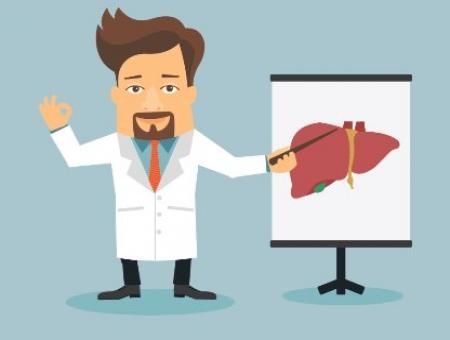
Alcoholic Hepatitis: Unraveling the Complexities of a Debilitating Liver Disease
By Medical Expert Team
Aug 04 , 2023 | 2 min read
1
Your Clap has been added.
Thanks for your consideration
Share
Share Link has been copied to the clipboard.
Here is the link https://www.maxhealthcare.in/blogs/alcoholic-hepatitis
Alcoholic hepatitis is a serious liver condition caused by drinking too much alcohol for a long time. It's a significant part of alcohol-related liver diseases (ALD) and affects people worldwide.
What Causes Alcoholic Hepatitis?
Drinking too much alcohol can harm your liver over time. When you consume alcohol regularly, your liver starts storing fat, leading to a condition called steatosis. This fat buildup disrupts the liver's normal functions, causing it to produce harmful substances called reactive oxygen species (ROS) and free radicals. These substances damage the liver cells, and that's when alcoholic hepatitis develops.
Recognising Alcoholic Hepatitis
Alcoholic hepatitis can show different signs depending on its severity. Common symptoms include yellowing of the skin and eyes (jaundice), a swollen liver (hepatomegaly), a buildup of fluid in the abdomen (ascites), and confusion due to liver problems (hepatic encephalopathy). Some people may also experience fever, loss of appetite, and weight loss.
Getting Diagnosed
To diagnose alcoholic hepatitis, doctors consider your medical history, do a physical exam, and order some tests. They'll check your liver enzyme levels, like ALT and AST, to see if your liver is damaged. A specific sign of alcoholic liver disease is when AST levels are higher than ALT levels. Doctors may also measure your bilirubin levels to assess your liver function. In some cases, they may need to do imaging tests or a liver biopsy to confirm the diagnosis and see how bad the liver damage is.
Treatment Strategies for Alcoholic Hepatitis
Effectively managing alcoholic hepatitis necessitates a comprehensive approach, including alcohol cessation, nutritional support, and pharmacological interventions.
-
Alcohol Cessation: A Prerequisite for Recovery
Ceasing alcohol consumption is the cornerstone of alcoholic hepatitis treatment. Complete abstinence significantly improves liver function and mitigates the risk of disease progression.
-
Nutritional Support: Reversing Malnutrition
Alcoholic hepatitis patients often suffer from malnutrition, emphasising the need for nutritional support. A well-balanced diet and vitamin supplementation play pivotal roles in rejuvenating the liver.
-
Pharmacological Interventions: Debating the Role of Corticosteroids
Traditionally, glucocorticoids like prednisolone have been administered for severe alcoholic hepatitis. However, their benefits and potential adverse effects remain subject to ongoing debates. Emerging therapies, such as pentoxifylline and N-acetylcysteine, show promise in reducing inflammation and enhancing outcomes for specific cases.
Alcoholic hepatitis is a serious liver disease caused by prolonged and excessive alcohol consumption. It harms your liver by disrupting its normal functions and causing inflammation. The signs can vary, but if you experience symptoms like jaundice or confusion along with a history of heavy drinking, it's essential to see a doctor. Early diagnosis and treatment are crucial for a better chance of recovery. Remember, the best way to prevent alcoholic hepatitis is to drink alcohol responsibly and in moderation. Taking care of your liver is taking care of your health!

Written and Verified by:
Medical Expert Team
Related Blogs

Dr. Nivedita Pandey In Gastroenterology, Hepatology & Endoscopy , Liver Transplant and Biliary Sciences
Nov 08 , 2020 | 2 min read

Dr. Nivedita Pandey In Gastroenterology, Hepatology & Endoscopy , Liver Transplant and Biliary Sciences
Nov 08 , 2020 | 2 min read

Dr. Nivedita Pandey In Gastroenterology, Hepatology & Endoscopy , Liver Transplant and Biliary Sciences
Nov 08 , 2020 | 2 min read
Blogs by Doctor
Most read Blogs
Get a Call Back
Related Blogs

Dr. Nivedita Pandey In Gastroenterology, Hepatology & Endoscopy , Liver Transplant and Biliary Sciences
Nov 08 , 2020 | 2 min read

Dr. Nivedita Pandey In Gastroenterology, Hepatology & Endoscopy , Liver Transplant and Biliary Sciences
Nov 08 , 2020 | 2 min read

Dr. Nivedita Pandey In Gastroenterology, Hepatology & Endoscopy , Liver Transplant and Biliary Sciences
Nov 08 , 2020 | 2 min read
Blogs by Doctor
Most read Blogs
- CAR T-Cell Therapy
- Chemotherapy
- LVAD
- Robotic Heart Surgery
- Kidney Transplant
- The Da Vinci Xi Robotic System
- Lung Transplant
- Bone Marrow Transplant (BMT)
- HIPEC
- Valvular Heart Surgery
- Coronary Artery Bypass Grafting (CABG)
- Knee Replacement Surgery
- ECMO
- Bariatric Surgery
- Biopsies / FNAC And Catheter Drainages
- Cochlear Implant
- More...





